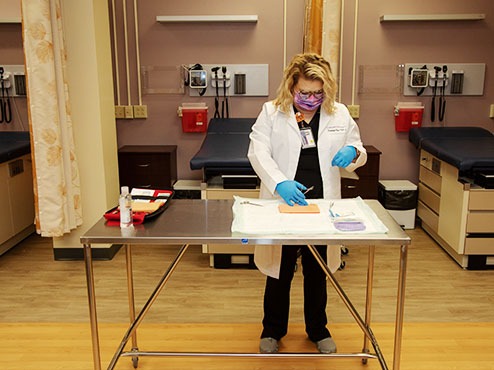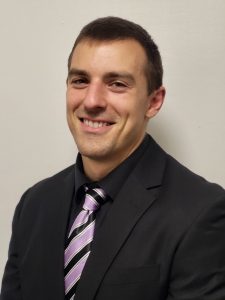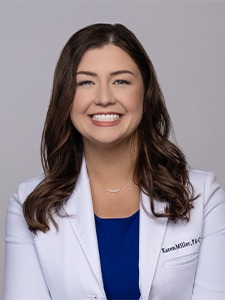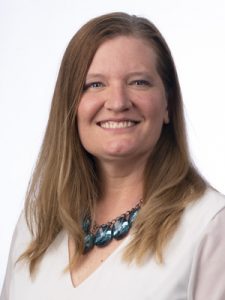Elevate your clinical experience. Become a physician assistant.
Carlow University offers a new and innovative cohort-based physician assistant program. Accelerate your learning with this 25-month program designed to build upon your prior healthcare experience and the clinical skills you already have. There’s nothing like being in a holistic and supportive academic environment that provides personalized attention in the classroom and lab. Our program ensures that clinical application is a big part of your transformational educational experience. It consists of a three-phase curriculum, grounded in Carlow’s mercy values, taught in a multidisciplinary environment alongside other healthcare professionals. This environment equips students with integral skills including ethical leadership, compassionate care and interprofessional collaborative competencies.
Upon graduation, students are prepared to take the Physician Assistant National Certification Examination (PANCE) and pursue a versatile and in-demand career as a physician assistant.
Admission requirements and application process
Start your application today! To get started, view or download our admissions policy for detailed admission requirements and application process (not all documents are necessary to start your application).
If you have any questions throughout the process or need guidance, our PA enrollment counselor, Kate Throckmorton, is here to help. You can reach her by email: kjthrockmorton@carlow.edu.
Final Deadline
Apr. 1
Priority Deadline
Dec. 1

Credits required:
102 credits
Cost per credit:
$978/credit
Time to degree:
6 semesters
Delivery:
On campus
Physician Assistant academic curriculum
Students progress through the physician assistant curriculum as members of a cohort in three phases: didactic, clinical experience and transition to practice. Interprofessional collaboration, a founding concept of the physician assistant profession, is at the core of each phase; providing students the opportunity to learn collectively with multiple healthcare disciplines. This collaborative education experience encourages meaningful alliances and ultimately prepares students to practice high-quality clinical care as a member of a healthcare team.
Learn in our simulated hospital environment
The Celtic Simulation Center for Innovative Learning (CSCIL) is a simulated hospital environment designed for student experiential learning. Primarily during the didactic phase, physician assistant students, alongside other healthcare disciplines, experience predetermined scenarios to practice clinical decision-making, diagnosis, procedures, and patient communication and interaction in a safe and realistic environment.
Curricular phases
- Phase 1: Didactic: An intense period of instruction meant to impart clinical knowledge, skills and attitudes in preparation for clinical practice
- Phase 2: Clinical experience: An experiential phase of education whose purpose is to apply the knowledge, skills and attitudes needed for patient care in a supervised environment, includes:
- 8 clinical rotations in areas including family medicine, internal medicine, emergency medicine, surgery, behavioral medicine, women’s health, pediatrics and elective
- 5 weeks, full-time (average of 40 hours per week)
- Sites are practices and healthcare systems located in southwestern Pennsylvania, including Pittsburgh, as well as across the country
- Phase 3: Transition to practice: The final period of the formal education program intended to prepare graduates for successful entrance into the profession and clinical practice

Rotation disciplines
- Family medicine
- Internal medicine
- Emergency medicine
- Surgery
- Behavioral medicine
- Women’s health
- Pediatrics
- Elective
What is a Physician Assistant?
“Physician assistants (PAs) are medical professionals who diagnose illness, develop and manage treatment plans, prescribe medications and often serve as the patient’s principal healthcare provider. With thousands of hours of medical training, PAs are versatile and collaborative. PAs practice in every state and in every medical setting and specialty, improving health care access and quality.” American Academy of Physician Assistants (AAPA)
Additional resources can be found on the AAPA website including the history of the profession, scope of practice and ethical conduct.
Positive job outlook & lucrative salary
A career as a Physician Assistant provides one of the most versatile and flexible opportunities in healthcare, with the ability to work in any medical or surgical specialty or sub-specialty. According to the U.S. Bureau of Labor Statistics, PA jobs are projected to rise 30% through 2028 with a median pay of $112,260.
A number of state and national organizations provide PAs with advocacy, education, and support including:
Physician Assistant faculty

Alison Wix, MPA, PA-C Program Director

Dominic Violi, DPT, CSCS Assistant Professor

Karen Miller, DPAS, MAS, MS, PA-C Assistant Professor

Sarah Donaldson, MPA, PA-C Director of Clinical Education
Program information, outcomes & policies
View or download the following files:
Required program policies for applicants:
View or download the following policies:
- Cost of Attendance Policy (Tuition & Fees)
- Technical Standards Policy [pdf]
- Advanced Placement Policy [pdf]
- Admission and enrollment practices that favor specified individuals or groups [pdf]
- Program required competencies for entry level practice, consistent with the competencies as defined by the PA profession [pdf]
Contact Admissions
If you are interested in this graduate program, our Admissions team is available to assist you with the next steps, including scheduling an on-campus visit.

ARC-PA accreditation status
The ARC-PA has granted Accreditation-Provisional status to the Carlow University Physician Assistant Program sponsored by Carlow University.
Accreditation-Provisional is an accreditation status granted when the plans and resource allocation, if fully implemented as planned, of a proposed program that has not yet enrolled students appear to demonstrate the program’s ability to meet the ARC-PA Standards or when a program holding Accreditation-Provisional status appears to demonstrate continued progress in complying with the Standards as it prepares for the graduation of the first class (cohort) of students.
Accreditation-Provisional does not ensure any subsequent accreditation status. It is limited to no more than five years from matriculation of the first class.
The program’s accreditation history can be viewed on the ARC-PA website at http://www.arc-pa.org/accreditation-history-carlow-university/.
Students who graduate from a program with provisional accreditation or continuing accreditation status are eligible for certification and licensure after successfully passing the PANCE.

